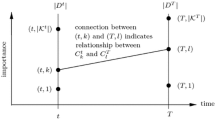Abstract
The Web is a great resource and archive of news articles for the world. We present a framework, based on probabilistic topic modeling, for uncovering the meaningful structure and trends of important topics and issues hidden within the news archives on the Web. Central in the framework is a topic chain, a temporal organization of similar topics. We experimented with various topic similarity metrics and present our insights on how best to construct topic chains. We discuss how to interpret the topic chains to understand the news corpus by looking at long-term topics, temporary issues, and shifts of focus in the topic chains. We applied our framework to nine months of Korean Web news corpus and present our findings.
Access this chapter
Tax calculation will be finalised at checkout
Purchases are for personal use only
Preview
Unable to display preview. Download preview PDF.
Similar content being viewed by others
References
Allan, J.: Introduction to topic detection and tracking. In: Topic Detection and Tracking, Event-based Information Organization, pp. 1–16 (2002)
Blei, D., Lafferty, J.: Dynamic topic models. In: Proceedings of the 23rd International Conference on Machine Learning (2006)
Wang, X., McCallum, A.: Topics over time: a non-markov continuous-time model of topical trends. In: Proceedings of the 12th ACM SIGKDD International Conference on Knowledge Discovery and Data Mining (2006)
Blei, D., Ng, A., Jordan, M.: Latent dirichlet allocation. The Journal of Machine Learning Research, 993–1022 (2003)
Nallapati, R., Feng, A., Peng, F., Allan, J.: Event threading within news topics. In: Proceedings of the Thirteenth ACM International Conference on Information and Knowledge Management (2004)
Feng, A., Allan, J.: Finding and linking incidents in news. In: Proceedings of the Sixteenth ACM Conference on Information and Knowledge Management (2007)
Allan, J., Gupta, R., Khandelwal, V.: Temporal summaries of new topics. In: Proceedings of the 24th Annual International Conference on ACM SIGIR Research and Development in Information Retrieval (2001)
Blei, D., Lafferty, J.: Topic models. In: Text Mining: Theory and Applications, pp. 71–93 (2009)
Wang, X., Zhang, K., Jin, X., Shen, D.: Mining common topics from multiple asynchronous text streams. In: Proceedings of the Second ACM International Conference on Web Search and Data Mining (2009)
Bolelli, L., Ertekin, Ş., Giles, C.: Topic and trend detection in text collections using latent dirichlet allocation. In: Boughanem, M., Berrut, C., Mothe, J., Soule-Dupuy, C. (eds.) ECIR 2009. LNCS, vol. 5478, pp. 776–780. Springer, Heidelberg (2009)
Leskovec, J., Backstrom, L., Kleinberg, J.: Meme-tracking and the dynamics of the news cycle. In: Proceedings of the 15th ACM SIGKDD International Conference on Knowledge Discovery and Data Mining (2009)
Shahaf, D., Guestrin, C.: Connecting the dots between news articles. In: Proceedings of the 16th ACM SIGKDD International Conference on Knowledge Discovery and Data Mining (2010)
Mei, Q., Zhai, C.: Discovering evolutionary theme patterns from text: an exploration of temporal text mining. In: Proceedings of the Eleventh ACM SIGKDD International Conference on Knowledge Discovery and Data Mining (2005)
Mei, Q., Liu, C., Su, H., Zhai, C.: A probabilistic approach to spatiotemporal theme pattern mining on weblogs. In: Proceedings of the 15th International Conference on World Wide Web (2006)
He, Q., Chen, B., Pei, J., Qiu, B., Mitra, P.: Detecting topic evolution in scientific literature: how can citations help? In: Proceeding of the 18th ACM Conference on Information and Knowledge Management (2009)
Newman, D., Asuncion, A., Smyth, P.: Distributed algorithms for topic models. The Journal of Machine Learning Research 10, 1801–1828 (2009)
Chang, J., Boyd-graber, J., Gerrish, S., Wang, C., Blei, D.M.: Reading tea leaves: How humans interpret topic models. In: Advances in Neural Information Processing Systems (2010)
Author information
Authors and Affiliations
Editor information
Editors and Affiliations
Rights and permissions
Copyright information
© 2011 Springer-Verlag Berlin Heidelberg
About this paper
Cite this paper
Kim, D., Oh, A. (2011). Topic Chains for Understanding a News Corpus. In: Gelbukh, A. (eds) Computational Linguistics and Intelligent Text Processing. CICLing 2011. Lecture Notes in Computer Science, vol 6609. Springer, Berlin, Heidelberg. https://doi.org/10.1007/978-3-642-19437-5_13
Download citation
DOI: https://doi.org/10.1007/978-3-642-19437-5_13
Publisher Name: Springer, Berlin, Heidelberg
Print ISBN: 978-3-642-19436-8
Online ISBN: 978-3-642-19437-5
eBook Packages: Computer ScienceComputer Science (R0)




